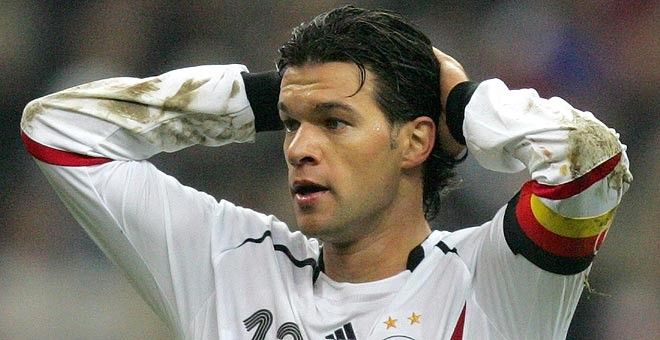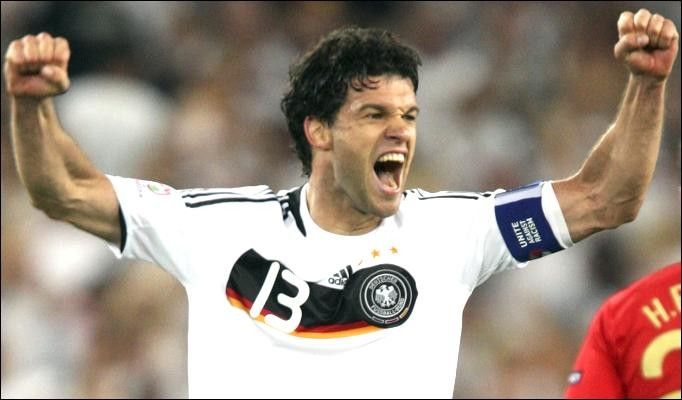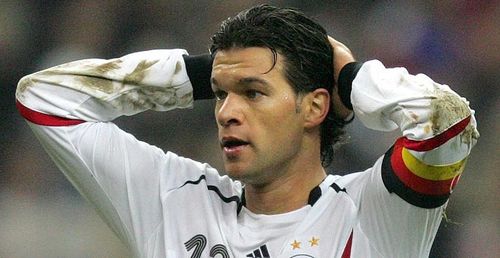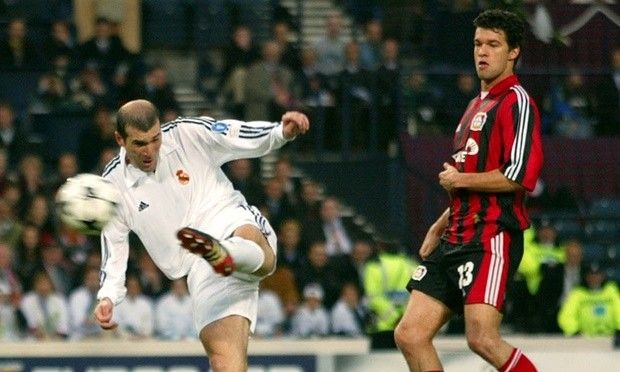
Michael Ballack: The glorious, unlucky hero who carried Germany through the dark ages
He sank to the ground, not quite believing it.
He had done this a hundred times before – run on to a knock-down in the area and hammer it into the top corner of the net. He ran in. He hammered it. As always, he had got the basics right – timing his run into the box from deep within the midfield with impeccable precision to perfectly elude any would-be markers, catching the ball on the volley with that wonderful technique honed over years of kicking the ever-loving leather off of footballs and hitting it with the kind of power that often tested the limit of the net’s strength.
9 out of 10 times, it would have gone in. This time though, it didn’t. With Iker Casillas watching on helplessly, the ball had whistled past the great goalkeeper’s left-hand post, missing it by mere inches.
Michael Ballack held his head in his hands; somehow he knew this had been the one great chance to equalize. With Spain leading 1-0 and looking comfortable deploying their unique brand of football that would come to be known as tiki-taka, he knew that such chances wouldn’t fall his, or his team’s, way again that match.
Spain won the match 1-0 and with it lifted the Euro 2008 trophy. Germany, and Ballack, were left wondering what could have been. At the end of it all, Ballack must surely have felt that tingling, familiarly unfamiliar sensation of Déjà vu.
After all, he had seen many a title being snatched away from him at the very last moment - Bundesliga championships, Premier League titles, Champions League crowns, even the two World Cups he had played in. And now, there was one more memory to add to that most unenvied of collections.
Elite sport has always been a domain of fine margins; where inches and seconds can spell the difference between victory and defeat; and he had ended on the wrong side of the margin far too many times for it to be just a coincidence.
Michael Ballack was quite simply – in more ways than one - the unluckiest player of his generation.
The right place at the wrong time
26th September 1976; a birthdate that was both a blessing and a curse. Michael Ballack was the outstanding player of his generation in Germany. He was also the only world-class, world-beating outfielder they had for nearly a decade. Not only did Ballack become the most important part of the national team system (under the ever-popular Rudi Völler), he often times became the system in itself.
"Football is a simple game. Twenty-two men chase a ball for 90 minutes and at the end, the Germans always win." - The ever witty Gary Lineker’s famous line held no credence by the time Ballack had pulled on a German national team jersey over his head. They used to win back when Lineker was playing and they certainly win a lot these days but in the early 2000s they were quite frankly mundane at best. Ballack had been caught in between two gifted generations, thrown into a midfield that had neither a Lothar Matthäus nor a Mario Götze.
Without anything remotely resembling support, the pressure on him to perform and to get the national team back to its proud winning ways was at times ludicrous. Like the never-too-shy-to-voice-his-opinion German put it himself – “They wanted me to win the ball at the back, dominate in the center, play a pass to myself in the final third, and score the goal!”
Funny thing is, at times it felt like he did do just that. He stood up in the big games, making sure to step up his game and more often than not he would be the one scoring that all important goal – like the one against South Korea in the 1-0 semifinal victory in the ’02 World Cup, where he finished off a move he himself had started.
He did it for Germany – with whom he scored an amazing 42 goals in 98 matches – as well as for Kaiserslautern, Bayer Leverkusen, Bayern Munich (the latter two clubs were where he had been at his absolute peak) and Chelsea (that game winning performance at Old Trafford remains one of the great individual displays seen in the rich history of the English League)
And yet, he could never catch a break.
In 2002, he lost four titles that had been within touching distance – the DFB Pokal, the Bundesliga (where his team Bayer Leverkusen lost steam with three games to go, and squandered their lead), the Champions League (which was won by a moment of ethereal genius from the great Zinedine Zidane) and the World Cup (where he found himself suspended for the final after having almost single-handedly dragged an awfully uninspiring Germany to the damn thing in the first place).
In 2008, he gave a repeat performance - this time with Chelsea. The League Cup and the Premier League (remember that match winning performance at OT mentioned earlier? Well that brought Chelsea level on points with United with two games to go. But they drew their last match and United won theirs) were lost along with the Champions League (a Didier Drogba red card, and a John Terry slip handing over the crown to Manchester United) and the European Championship that Spain tiki-taka-ed away with.
In between all that, he also inspired a young German side to the semifinals of the 2006 World Cup, where they lost to eventual champions, Italy in what was arguably the finest world cup match since the turn of the century.
And how did his career end with the national team that he had carried for so long? A broken leg resulting from a brutal challenge from Kevin Prince Boateng in the 2010 FA Cup final, kept him out of the 2010 World Cup squad and eventually led to him disappearing off the radar without as much as a loud blip.
Of course, it had to be something as unfortunate as that.
The legacy - what it should be
Yet, we shouldn’t remember him as the nearly-man, as the unluckiest player of his generation, as the man who almost attained true greatness. He deserves far better than that.
4 Bundesliga titles (including one in his first ever season in the top flight – with Kaiserslautern), 3 DFB Pokal, 1 DFB Ligapokal, 3 FA Cups, 1 League Cup and 1 Premier League title weren’t won by accident. For Germany, he was absolutely immense, “the lone shining light in a leaden era” as Udo Muras wrote at the time of his retirement.

Forget “Ballack – the Tragic Story of the nearly-man”; celebrate “Ballack – the Remarkable game-dominating Midfield general”.
He had everything a midfielder could ask for – and then some.
He played upright, head held high, always looking for a teammate. He could pass the ball along with the metronomic regularity that so often holds the key to winning matches, but he could just as easily sweep a 60-yard diagonal to the feet of a team-mate when the need arose. He could run all night long, and cover tremendous distances, without ever really seeming to run all that much.
At 6’2” he was a big man, and he used his height well in the air. His heading abilities combined with his innate strength that enabled him to “look after himself” - as they would say - and that rare ability to take over a game by the scruff of its neck, to give him the look of an old fashioned no. 6.
And by Odin’s Beard! He could he hit a football.
He was also a great team player; selfless to the point of being almost self-destructive. The tactical foul against Korea in that World Cup semifinal that earned him the yellow - which kept him out of the final - was the intentional act of man who knew exactly what he was doing. Just like it was his willingness to let the team’s interests take precedence that led to him taking a step back for both Germany and Chelsea and start playing as a more defensive-oriented, secondary shield kind of a midfielder.
Most importantly though, he carried the weight of a proud footballing nation’s expectations and hopes without once flinching at, or shirking away from, that immense responsibility. Not only did he not let them sink, he almost carried them all the way to Glory – not once, but thrice.
There is honour in such brave, glorious failure and for that Der Capitano, take a bow. You shall always be remembered as a true Hero of the game.
Post Script: Curse of the no. 13?
Many believed it was the fateful attachment to his favourite number – 13 –that led to his misery. For anyone who believes that particular superstition to be true, a glance at who wears 13 for Die deutsche Fußballnationalmannschaft these days would do a world of good..
The player in question? - Golden boot and Silver Boot winning World Champion Thomas Muller – arguably the (third) best footballer on the planet


